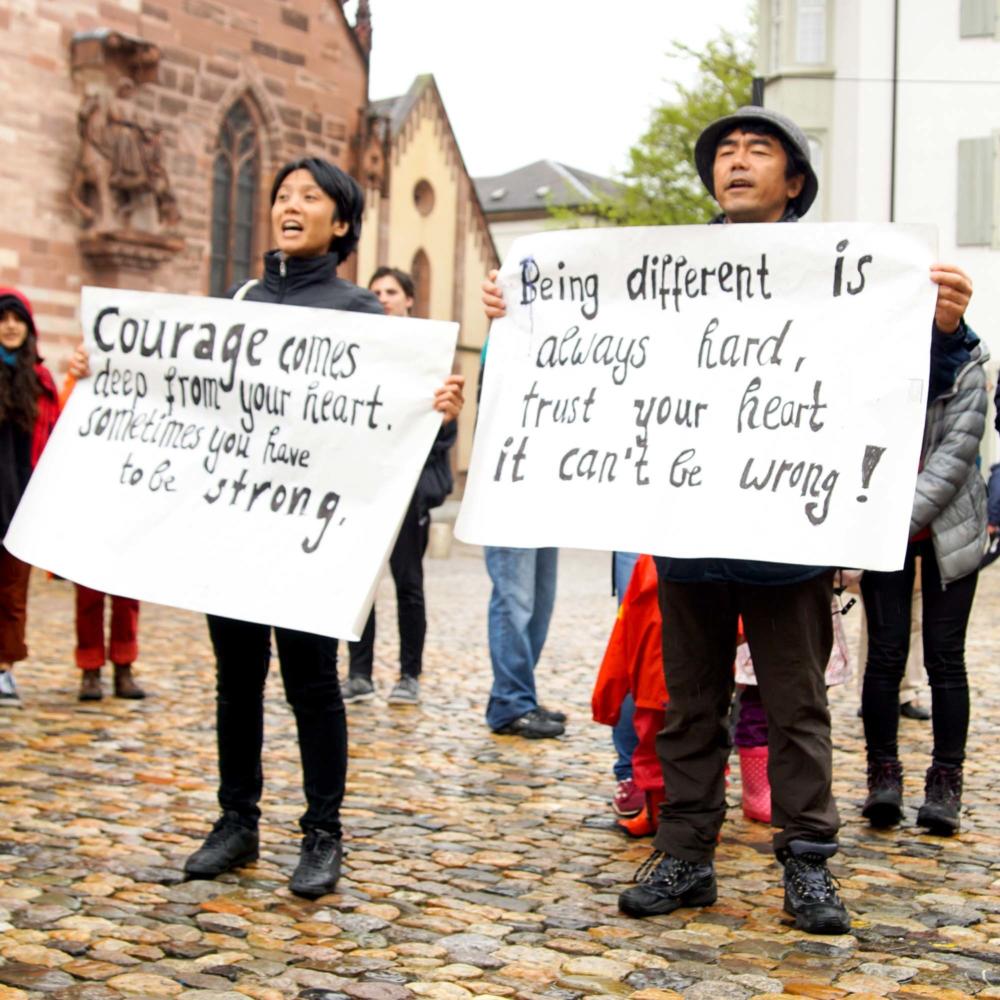Acting from the heart
«Courage» was the theme and title of an international student conference at the Goetheanum from 23 to 27 April. Around 650 students from more than thirty countries shared their thoughts on courage in various contexts, including a public performance on Basel’s Münsterplatz.
Question 1: what is courage? In what kind of situations are you courageous and where does this courage come from? What is the role of courage for us young people today? How do courage and fear affect intercultural encounters and personal or social developments?
In her opening lecture Constanza Kaliks, head of the Youth Section at the Goetheanum, spoke of the origin of the word ‹courage› which, literally translated, means ‹acting from the heart› - a definition that resonated strongly with the audience.
In the Foyer, the students could write their answers to the various questions on large placards and some of these answers were read out the next morning. Two examples of answers to the first question were: «Courage is breaking with norms» and «Courage is the absence of fear».
Choice and decision
Fear was also at the centre of questions that were asked on the next day. Question 2: How do you experience fear and recklessness within yourself and in the world? Where are the boundaries between courage, recklessness and fear? Are there situations where fear and recklessness can be useful? Marina Helou, a state representative from São Paolo (BR), explained that, for her, courage had to do with an impulse that comes from the heart but that is then weighed up by the head. If there is no choice first of all, followed by a commitment to a particular decision or action, one cannot really speak of courage, because the person in question acts either out of fear or recklessly.
Here are some of the responses to question 2: «Recklessness is born from insecurity, insecurity comes from fear.» «I feel reckless or fearful when I lose control or when I feel alone.» «Fear is an instinct, courage a decision».
Question 3: What would the world be like if what lives in you became reality and what would you do to make this happen? We asked ourselves this question, which was inspired by a question once posed by Rudolf Steiner, on the third day. A research project on this question is being conducted by the Youth Section at the Goetheanum (see Always developing).
Helmy Abouleish (CEO at Sekem, EG) spoke in his lecture of two future streams, Futurum and Adventus. Futurum means looking towards the future from the past and seeing the future as a series of logical consequences. Adventus means looking at our task from the future or looking at what wants to come towards us. Some of the answers to questions 3 were: «A place of balance between giving and taking». «A world where one can love oneself unconditionally». «Can we create a shared utopia? Could my utopia be another person’s dystopia [pessimistic image of the future]?»
A challenging freedom
Working on these topics together brought us to question 4: the question of personal and shared identity. What is identity? What do we identify with and why? How can we develop an understanding of our self that no longer requires us to identify with external, mostly excluding, circumstances such as culture or being a Waldorf pupil? What is left to us as a young generation that has grown up with the quite challenging freedom of not having to obey social or religious norms and rules, when we let go of everything that allows a ‹We› and ‹You› to emerge?
The question as to what identity means in relation to a group also featured in the ‹Creative Intervention› that was performed in Basel. Participants were invited to observe themselves as part of a group in relation to those outside the group. A great openness and warmth, noticeable from within and without, was emanating from the group. An unspoken conclusion could be that it is possible to be part of a clearly defined group and yet enrich the life of those outside the group; that it is possible to have warmth within and carry this warmth outside, so that the question of inside and outside becomes irrelevant.
The musician and journalist André Stern then spoke of freedom in child development, raising the question as to whether formal learning and educational institutions prevent this freedom. How do education and learning influence the way children find their own identity?
The day ended with group performances by students from different countries. One student from Brazil expressed her gratitude for Waldorf Education and for having the chance to unfold her potential freely in her school in Brazil.
Fighting for one’s goals
On the last day we returned to question 1: what is courage? After five days of discussion, some students presented the essence of what had lived at this conference. Lorena Carazo from Spain said how important it was to critically question one’s inner attitude towards the world: if hatred of other people’s mistakes is the driving force behind my actions, the message of my actions can’t be one of love.
Pedro Munizaga Sgombich, a student from Chile, concluded the presentations with the encouragement to fight for one’s goals even in times of darkness and to see the darkness as a necessary counterpart of light and as a chance for oneself and for the world to develop further. Some answers to the question were: «Courage is taking a chance in order to bring about change», «Courage is trust in yourself and in the world», «Courage needs love and love needs courage».
The question we gave everyone to take along with them was «Can courage lead to freedom?»
Ronja Eis and Till Höffner, Youth Section co-workers and main organizers of the conference «Courage»

